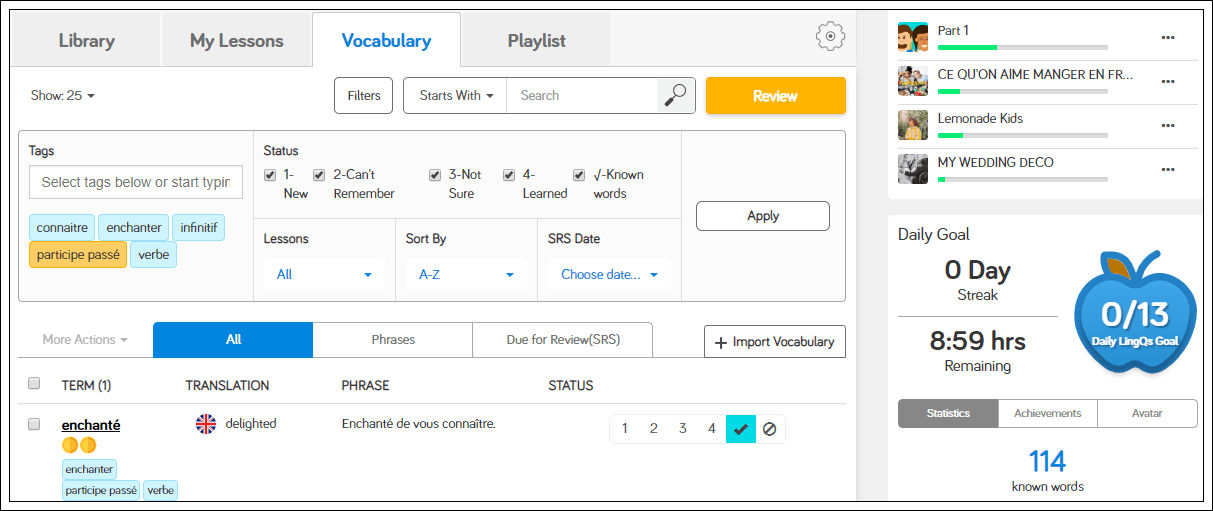5 Common French Verbs for Beginners
In the past, we’ve covered things such as reflexive and irregular verbs, however, today we’re going to simplify things a little bit and look some of the most common French verbs for beginners.
When learning the French language, it’s easy to be overwhelmed by all the different tenses of types of verbs. However, as you progress with your understanding of the French language, you’ll soon start to see that there’s no reason to be intimidated by French verbs.
Below, we’ll go over five of the most common French verbs that are easy enough for beginners to learn.
Common French Verbs: Être
Être is problem THE most commonly used verb in the French language. For this reason, it’s important to learn this verb and understand how to use it properly if you want to master the French language. Être is translated as “To be” in English and is an irregular verb that can be used as a supporting verb for in compound verb tenses. Let’s look at a few examples conjugated in the present tense:
- Je suis Canadien. – I am Canadian.
- Tu es un homme. – You are a man.
- Il/elle est mon enseignant(e). – He/she is my teacher.
- Nous sommes les employés. – We are the employees.
- Vous êtes nouveau ici ? – You are new here ?
- Ils/elles sont intelligent(e)s. – They are smart.

Common French Verbs: Avoir
Translated into English, this verb means, “To have” and is another one of the most commonly used verbs in French. Avoir, is also an irregular verb that can be used to create compound verb tenses. Let’s take a look at few examples in both French and English to give you a better idea on how to conjugate the verb Avoir properly.
- J’ai un chien. – I have a dog.
- Tu as une rhume. – You have a cold.
- Il/elle a un chemise blanc. – He/she has a white shirt.
- Nous avons recu une lettre. – We have received a letter.
- Vouz avez plusieurs admirateurs. – You have many admirers.
- Ils/elles ont des billets. – They have tickets.

Common French Verbs: Vouloir
Here’s another verb that can come in handy when you want or need something. Vouloir means “To want” in English, and no matter how you look at it, this one can be a life saver when first starting out in the French language. Let’s look at a few conjugations as examples.
- Je veux un verre de thé. – I want a glass of tea.
- Tu veux un café? – Do you want a coffee?
- Il/elle veut apprendre. – He/she wants to learn.
- Nous voulons manger. – We want to eat.
- Vouz voulez un chat. – You want a cat.
- Ils/elles veulent une bouteille d’eau. – They want a bottle of water.

Common French Verbs: Demander
Demander is a regular verb that means “To ask” in English. However, it’s important to remember that Demander is used when you’re asking for an object, while the expression, “poser une question” means “ask a question”. Here are a few examples to help you out with the regular verb.
- Je demande un stylo. – I ask for a pen.
- Tu me demande qui. – You ask me who.
- Il/elle demande de l’aide. – He/she asks for help.
- Nous demandons des questions. – We ask questions.
- Vous demandez une explication. – You ask for an explanation.
- Ils/elles demandent du café. – They ask for coffee.

Common French Verbs: Aller
Coming in as our 5th most common verb for beginners is Aller. Aller means, “To go”, which is extremely useful, especially when you’re trying to get somewhere. Just like the other French verbs, Être and Avoir, Aller is another irregular verb that can be used as part of a compound verb, most often in a future tense. Let’s look at a few examples.
- Je vais à l’école. – I’m going to school.
- Tu vas faire du shopping. – You’re going shopping.
- Il/elle va chez le docteur. – He/she is going to the doctor.
- Nous allons gagner. – We’re going to win.
- Vous allez perdre. – You’re going to lose.
- Ils/elles vont chez eux. – They’re going home.

French Verbs on LingQ
LingQ has thousands of hours of French content to help improve your listening and reading skills. The best part is that you’ll be learning verbs in context rather than isolation. This will help you understand how French grammar works as well as allow you to start forming sentences on your own.
Speaking of verbs, LingQ has recently released an awesome feature to help you learn verbs faster. Known as automatic grammar tagging, this feature will auto-generate tags for every verb you highlight while going through a lesson in LingQ.

What’s great about this is that you can see the categories each verb belongs to and use these tags to help filter the verbs you want to review in LingQ’s vocabulary section.

Also, every time you highlight a verb (or any other type of vocabulary), LingQ shows how frequent it appears throughout the entire library. This is shown using coins, with 1 coin meaning low and 4 coins meaning high.

For more information on how to take full advantage of LingQ’s automatic grammar tagging, please check out this post.
LingQ is the best way to learn French online because it lets you learn from content you enjoy!
Good luck LingQing and improving your French!

